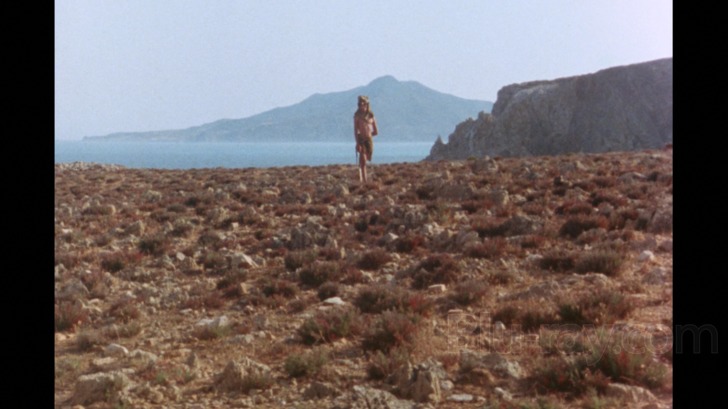Sebastiane Blu-ray Movie
HomeSebastiane Blu-ray Movie 
Derek JarmanKino Lorber | 1976 | 90 min | Not rated | Aug 07, 2012

Movie rating
6.3 | / 10 |
Blu-ray rating
| Users | 0.0 | |
| Reviewer | 3.0 | |
| Overall | 3.0 |
Overview
Sebastiane (1976)
Filmed entirely in vulgar Latin, this experimental film recounts the life of Sebastiane, a puritanical but beautiful Christian soldier in the Roman Imperial troops who is martyred when he refuses the homosexual advances of his pagan captain. When this film was released, it was the only English-made film to have required English subtitles, and it is an early film by the noted experimental and outspokenly homosexual director Derek Jarman, who died in 1994.
Starring: Richard Warwick, Lindsay Kemp, Leonardo Treviglio, Neil KennedyDirector: Derek Jarman, Paul Humfress
| Foreign | 100% |
| Drama | 58% |
| Erotic | 40% |
| History | 4% |
Specifications
Video
Video codec: MPEG-4 AVC
Video resolution: 1080p
Aspect ratio: 1.51:1
Original aspect ratio: 1.37:1
Audio
Latin: LPCM 2.0
Subtitles
English
Discs
25GB Blu-ray Disc
Single disc (1 BD)
Playback
Region A (locked)
Review
Rating summary
| Movie | 3.5 | |
| Video | 3.0 | |
| Audio | 2.5 | |
| Extras | 0.0 | |
| Overall | 3.0 |
Sebastiane Blu-ray Movie Review
A Martyr for Love
Reviewed by Casey Broadwater August 8, 2012An art-house sword 'n' sandal movie? A cinematic hagiography? A soft-core thrill? An examination of the tensions—and similarities—between the
rapture of the spirit and the lust of the flesh? Sebastiane is all of the above and more. The film was the first narrative feature from the late
English director, prolific diarist, and gay rights activist Derek Jarman—who co-wrote and directed the film with Paul Humfress—and it immediately
announced him as a filmmaker of unique vision and intent. Not only is Sebastiane one of the most frank and unhindered depictions of
homosexuality in 1970s cinema—it faced controversy for its nudity and sensuality—but it's also a remarkable portrayal of faith and the first film with
dialogue recorded entirely in Latin. Unless you've been classically educated, you'll want to make sure the subtitles are turned on.
The subject of the film is Saint Sebastian, an early Christian martyr and soldier whom the Roman emperor Diocletian had executed in AD 288 for the
crime of converting officials to the then-minority faith. A popular subject of paintings in the Middle Ages and throughout the Renaissance, Sebastian is
usually depicted tied to a tree and shot with multiple arrows. It's debatable whether or not these works of art were originally intended to be
homoerotic, but they unquestionably seem that way now, with the saint-to-be nearly naked, his chest straining forward, his arms pinned back or held
over his head BDSM-style, his flesh punctured and penetrated. He's that rare religious figure who's also become a gay icon.

Since Jarman is more interested in the suggestive iconography of the saint than strict biographical detail, he plays fast and loose with history, changing the story as he sees fit. Sebastiane begins with a Roman bacchanal that's straight out of Caligula or a Fellini film. A male performer painted white, his mouth dyed a crimson red, flails and flicks out his tongue, while a group of dancers wearing exaggerated phalluses air-hump around him and mock-ejaculate onto his face. Emperor Diocletian's sexed-up bash is interrupted when a Christian accused of arson is brought before him and promptly strangled to death. Sebastiane (Leonardo Treviglio)—the captain of the palace guard and Diocletian's personal favorite—comes to the man's defense, revealing himself as a fellow Christ-follower, and for this, he's stripped of his rank and exiled to a remote military post staffed by nine other persona non grata.
With nothing to do—no wars to fight, no one to guard—the men fill their days with rote weapons exercises, wrestling matches, and bawdy sexual hijinks. One soldier has a pornographic scroll—an ancient precursor to Playboy—and in another scene, the men watch copulating beetles and give their own crass play-by-play commentary. Two of the men pair up and head down to the rocky tidal pools to make love—this seems acceptable to the others, perhaps worthy of light teasing, but not out of the ordinary—and Jarman films them in hypnotic slow-motion as they splash and tousle with one another. Glimmering, rippling water is repeatedly used here as a visual motif suggesting the purity of love.
Sebastiane sets himself apart from the revelry; as a Christian, he's an outcast even among other outcasts, and he's especially hated by a brute named Maximus (Neil Kennedy), who sees him as a traitor to the Roman gods. When Sebastiane refuses to participate in sword practice and runs away—"A Christian doesn't fight," he says—the rebellious act earns him several lashes across his back with a whip. This bloody scene will remind most modern viewers of the similarly sadomasochistic Passion of the Christ, but on the whole, Jarman's film is more similar to the work of gay Italian director Pier Paolo Pasolini, whose The Gospel According to St. Matthew, like Sebastiane, blends realism with the influence of symbolic and religiously-loaded Renaissance art.
The crux of Sebastiane—aside from the literal one upon which the saint is eventually hung—is the spirit/flesh dichotomy that's always been a thorn in the side of the faithful. From the moment Sebastiane arrives at the camp, he becomes the object of lust for the stern and perhaps lonely Captain Severus (Barney James), a blond disciplinarian bent on "having" him. Though tormented and tortured—beaten, staked spread-eagle on the desert sand, dangled by his rope-tied wrists—Sebastiane repeatedly refuses Severus' physical advances, which only stokes the commander's desires. At the same time, Sebastiane has a kind of Stockholm syndrome relationship with his captor, growing to care for him with a righteously chaste love. He attunes his mind to the spiritual and guards himself against desire, but this passivity is itself provocative and maybe even a form of sadism. It's a complicated portrayal of devotion and yearning, one that's satisfyingly open to discussion/interpretation. And quite moving. The inevitable martyrdom sequence is devastating, as Sebastian's only confidante, Justin (Richard Warwick)—who harbors his own unrequited love—is forced by Maximus to follow suite with the other soldiers and shoot an arrow into his friend.
With a budget of only $45,000, Jarman had to work within some serious constraints, but this ultimately made for a better film. The lack of polish gives Sebastiane a dingy, realistically lived-in look, with the limited number of locations playing into the sense of edge-of-the-world isolation. When asked about the film's nudity, Jarman allegedly even joked, "We couldn't afford costumes." (Aside from one briefly glimpsed erection, there's nothing particularly explicit about the film, visually, but it is suffused with a thick atmosphere of testosterone and sex, a reminder that desire is a more potent emotion than satisfaction.) The director's greatest coup, though, is the use of vulgate Latin, which ironically keeps the dialogue from seeming too "common" and poetically elevates the material.
Sebastiane Blu-ray Movie, Video Quality 

Sebastiane is in the public domain and is currently available for free on the Internet Archive, but Kino's new 1080p/AVC-encoded Blu-ray transfer is worth the price of the disc, vastly outdoing any standard definition bootleg you'd find online. Granted, the low-budget film—filmed on 16mm and blown up for 35mm prints—is never going to look spectacular, but this edition at least seems true to source and nicely resolved, with none of the glaring compression issues seen on DVD or the version found on archive.org. Grain is visible and moves naturally—there's no digital noise reduction smearing here—and the picture is unsullied by edge enhancement or other unnecessary tweaks. The image is unavoidably soft almost all of the time, but I'm positive this is due to the focusing and lenses used and 16mm film stock, rather than any issue with the encode. Regardless, the improvement in clarity is apparent—closeups are sharper, details are more finely attuned—and there's never any doubt that you're looking at a high definition presentation. Although color does seem slightly washed out and faded, there are no distracting fluctuations, and the level of contrast is more than adequate. As with most Kino titles, there's been no significant restoration involved, and you will see semi-frequent white and black specks, small scratches, and occasional hairs stuck in the film gate. No major distractions, though. The quasi-widescreen 1.51:1 aspect ratio of the Blu-ray seems a bit odd—about halfway between 1.33:1 and 1.66:1—but since some theatrical showings of the film in England were cropped to avoid that single erect member, which we can clearly see here, it seems we're at least getting a more faithful version of the film.
Sebastiane Blu-ray Movie, Audio Quality 

Sebastiane's low-budget audio shows its age, but I doubt there was much Kino could do about it, despite giving the film a new uncompressed Linear PCM 2.0 track. The Latin dialogue is always understandable—or, at least, as understandable as Latin dialogue is going to be—but voices are a little muffled at times, and subject to some slight high-end peaking. You'll also hear frequent pops and crackles in the background as well, although these are quiet and never rise to the level of distraction. Of course, the film is notable for its early Brian Eno score—an ambient but still melodic wash of old-school synthesizer pads—and this too seems affected by time, with otherwise clean tones exhibiting a bit of pitch-wobble that doesn't seem intentional. Otherwise, the music has a decent sense of presence. The English subtitles on the disc are optional, but let's face it, you're probably not going to turn those off.
Sebastiane Blu-ray Movie, Special Features and Extras 

Unfortunately, there's not a single supplement on the disc.
Sebastiane Blu-ray Movie, Overall Score and Recommendation 

One of the films in the 1970s to deal most frankly with homosexuality, the beauty of Derek Jarman's Sebastiane was unfortunately overshadowed by the then-controversial nature of its content. Seen today, it's easier to appreciate the film's nuanced mingling of faith and flesh. Pasolini would be proud. The low-budget production has never looked sharp—it was shot on 16mm—but Kino's Blu-ray release at least seems true to its source. Recommended, especially for those interested in the narrow category of gay, religiously-themed cinema.
Similar titles
Similar titles you might also like

The Club
El Club
2015

City of Life and Death
南京!南京! / Nanjing! Nanjing!
2009

Emmanuelle
1974

Pioneer
Pionér
2013

Muriel, or the Time of Return
Muriel ou le temps d'un retour
1963

Story of Sin
Dzieje grzechu
1975

Julia
Es war nicht die Nachtigall | Standard Edition
1974

Birds of Passage
Pájaros de verano
2018

Beau Travail
1999

Identification of a Woman
Identificazione di una donna
1982

Horse Money
Cavalo Dinheiro
2014

Memories of the Sword
2015

Beanpole
Дылда / Dylda
2019

Caligula
The Imperial Edition | Caligola
1979

Spetters
1980

Kagemusha
影武者
1980

Tunes of Glory
1960

Hard to Be a God
Трудно быть Богом
2013

Immoral Tales
Contes immoraux
1974

No
2012